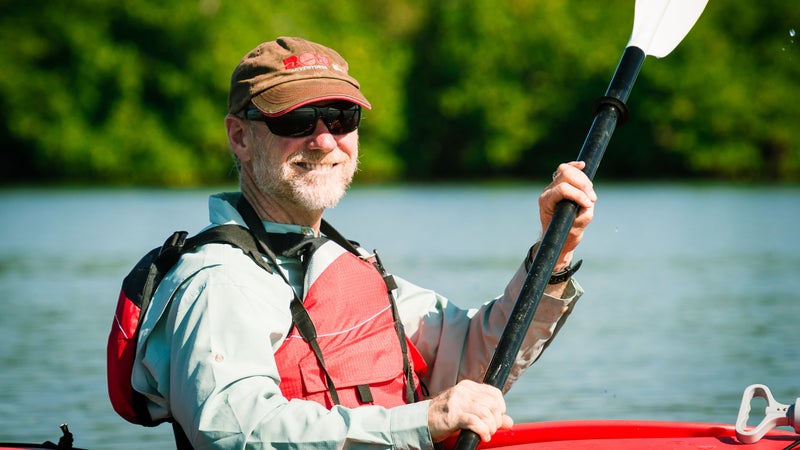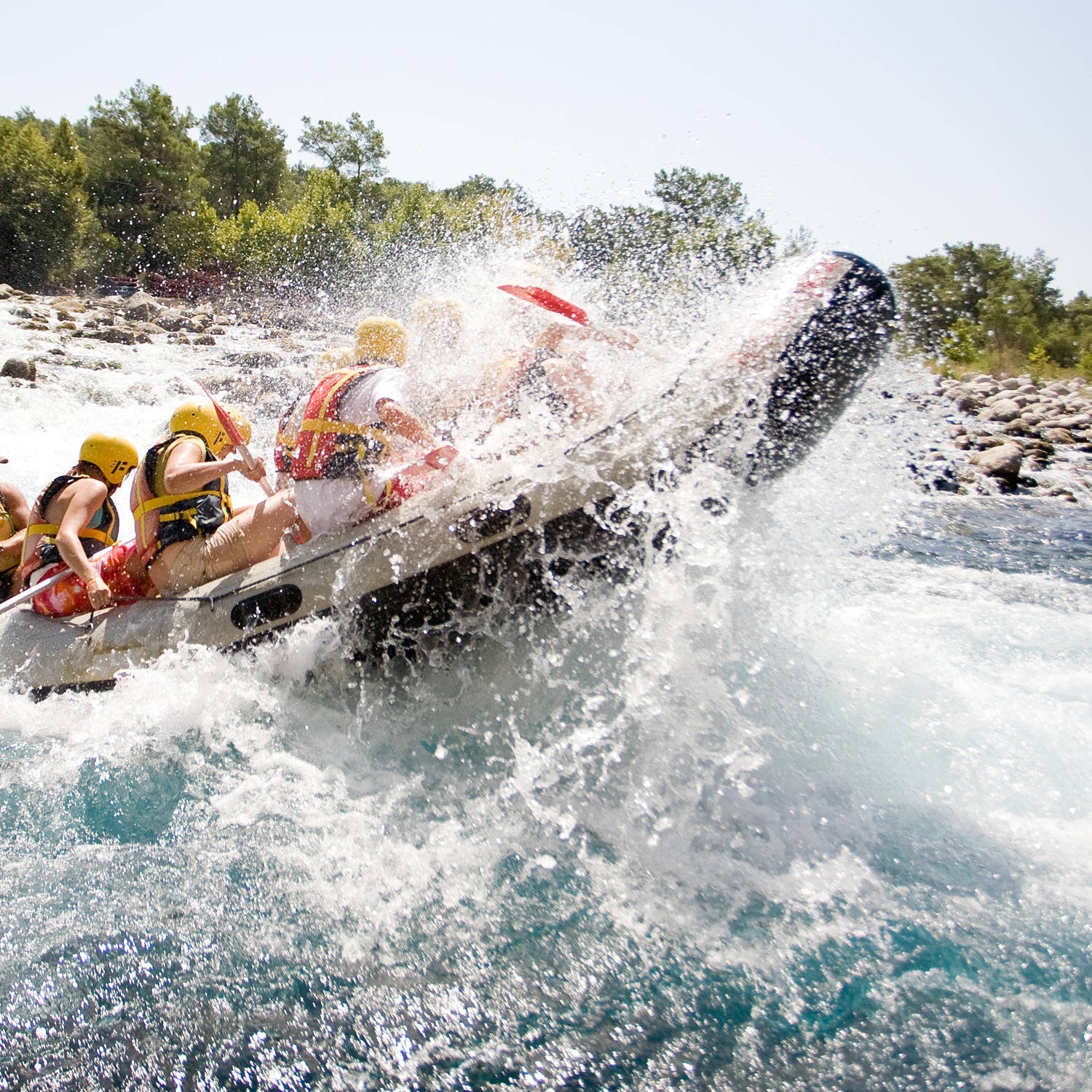After two years at St. John’s College in Annapolis, Maryland, Peter Grubb decided that his real classroom was the outdoors. He dropped out of school and took a summer job as a whitewater-rafting guide in West Virginia. After 111 one-day trips, he moved west to train on rivers in Oregon, California, and Idaho. Young and with nothing to lose, he founded in 1979 and started running his own trips in 1980. “Row was always a company driven by a passion for selling nature,” he says. “The motivation was never money, but to share the joy of being on the river with others.” Due to the short U.S. whitewater season, he started running trips abroad and eventually expanded his business to include hiking, biking and kayaking trips. He recently created a sister company, , focused on adventure travel in Cuba. “Like many entrepreneurs, creating new things and pioneering new trips has been my M.O.,” he says. “After 38 years, it keeps things interesting and keeps me out in nature.”
Age: 59
Job: Rafting guide and owner of adventure outfitter,
Hometown: Coalinga, California
Home Base: Coeur d’Alene, Idaho
Guiding Since: 1978
Places He’s Guided In: West Virginia, California, Oregon, Idaho, Montana, Alaska, Ecuador, Turkey, Croatia, Greece, Cuba, and France
Days Per Year on the River: 25 to 30
Days Per Year on the Road: 180
Rivers Row Runs: 17
Countries Row Runs Rafting, Biking, and Hiking Trips In: Over 25
Bucket List River: The in Tasmania
Whitewater Mecca: “Idaho might be the best place on the planet for wilderness whitewater.”
Best Advice He’s Been Given: “People expect too much out of life.”
Daily Ritual: “I make a list of priorities for the day and identify the tasks that are actually achievable.”

The Path to Guiding: “I studied the classics in college, then quit after two years, so I shouldn’t say you need a college degree to do this job. I came into it with no business sense. Work as a guide first so you can understand the business and discover for yourself if it’s as romantic as you envisioned. I started guiding for other companies, and by the time I decided to launch Row, I knew how to run a trip, how to do guest service logistics, and how to cook for a crowd.”
A Typical Day on the River: “You’re up at 6 A.M. for a 6:30 guide meeting and then serve breakfast by 7:30. After clean-up, you’re on the water by 9 or 9:30. I’ve always felt the best part of the day is on the water, because it’s almost not like work. When you get to camp you need to unpack, set up camp, and prep dinner. The days are long, and you have to be a people person.”
What People Don’t Understand About the Job: “The stress and risk are huge. Risk management today is much different than when I started out. There’s a much more serious tone in the safety orientations these days. Some risks have always been there but some have become greater—especially as people have become more sedentary—like cold water-induced shock, allergies, cardiac arrest. You take a 50-year-old male with a desk job who isn’t in great shape and he gets thrown out of the raft into cold water and panics and you have a big problem.”
On the Importance of Certifications: “At Row, you get paid based on how many rivers you can guide and your safety and skill certifications. Row has much higher guiding requirements than what Idaho requires. We require all guides to have at minimum advanced wilderness first aid certification and incentivize them to take the 80-hour class to get a wilderness first responder certification by saying we will pay extra per day for having that certification. Our guides also get paid extra for having their .”
The Less Glamorous Aspects of Guiding: “When you start out guiding, you aren’t making a sustainable living. New guides might make $60 to $100 a day plus tips and top guides $150 to $200, and you have to remember this is typically a four-month season. It’s definitely a lifestyle choice, and sometimes guides are living out of a car when they start. Also, people forget that the wilderness is a carry-in, carry-out world, so guides deal with human waste, and that really bothers some people.”
How He Minimizes Deskwork: “The first 15 years I did all of the marketing, bookkeeping, and payroll. I didn’t even know there was a thing called a payroll service. I was wearing every hat and keeping insane hours. Looking back, it would have been smarter financially to invest my time in other parts of the business rather than worry about saving money by not hiring a bookkeeper. Today I outsource things like payroll, and that has led to a much more balanced life.”
The Challenges of Working with Your Partner: “I hired Betsy and her boyfriend as guides in 1982. Let’s just say the boyfriend didn’t stay around. She and I started dating at the end of that season, were engaged in 1983, and married in fall of 1984. She gets half of the credit for where we are today. Those first five to six years we were both out guiding a lot, and at the end of the summer you are physically and emotionally drained from giving to others all season. Then you come back together as a couple and are supposed to give to each other, and neither of us had anything left. In retrospect, I wish we’d have had better boundaries between work and personal life because it was about the business all of the time. But we've managed to raise a family together and have made things work over the years.”
How He Stays Fit as a 60-year-old Guide: “The oldest river guide I’ve ever employed was 77. He didn’t work ten big trips back to back, but he could do four or five single-day trips. He was slow as molasses. I mean sometimes he was still washing dishes in the dark, but he got the job done. Longevity in this business is a question of staying fit and knowing your limitations. I’m turning 60 this year, and know I need to start working on my flexibility. I walk a lot and recently took up cycling. Paddling requires a lot of upper-body strength, so I do 25 to 30 push-ups as slow as possible every day. I also know at my age, I’m not a good candidate to guide a Class V trip. Those require a level of strength and stamina that might exceed my current ability.
The Most Rewarding Part of the Job: “About 15 years ago, I started running into guides in their mid thirties saying, ‘You know Peter, I’m so thankful for the summers I worked at Row. I learned so many life skills I use to this day.’ We impact a lot of people’s lives in the work we do. Certainly a lot of guests, but we don’t always hear back from the guests, whereas old guides we stay in touch with; they send Christmas cards. We’re now into a second generation of guides—people who work for us whose parents worked for us.”


